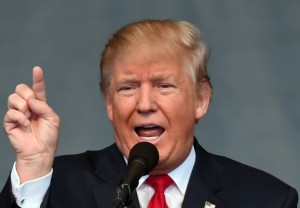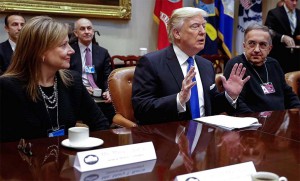
President Donald Trump continues to threaten to walk away from NAFTA, but officials are positive the revised deal can be completed.
While President Donald Trump continues to talk about walking away from the North American Free Trade Agreement if necessary, U.S. Commerce Secretary Wilbur Ross says he still expects to reach a deal with Mexico and Canada on revising the existing agreement.
“From time to time (the President) has expressed a total willingness to depart from NAFTA should that become necessary,” Ross, whose personal investment portfolio includes controlling interest a major automotive supplier with factories in Mexico told a panel in Washington D.C., according to TheHill.com.
“We don’t hope it will, we don’t desire that it will, we don’t believe that it will, but it is at least a conceptual possibility as we go forward.”
Mexican, U.S. and Canadian negotiators are meeting in Washington through the weekend to iron out changes to the pact on which automakers have come to depend. Car makers fear that altering key provisions of NAFTA or terminating the agreement could disrupt the industry’s supply chains and drive up costs for manufacturers and consumers.
U.S. Chamber of Commerce President Tom Donohue said in a speech in Mexico on Tuesday, “Let me be forceful and direct. There are several poison-pill proposals still on the table that could doom the entire deal.”

U.S. auto executives, including GM CEO Barra and FCA CEO Marchionne, have tried to press for fewer changes to NAFTA.
(Renault-Nissan’s Ghosn raises caution flag for U.S. auto market. For the story, Click Here.)
Donohue said increasing the percentage of parts that are used in cars and other products that have to be made in the U.S., Canada or Mexico to qualify for duty-free treatment under the deal is troublesome to negotiators from Canada and Mexico. The administration has not identified a specific percentage of minimum domestic content that it would like to see.
In addition, proposals from the Trump administration to impose a sunset clause that would stipulate that the revised trade agreement would terminate after five years unless all three countries agree it should continue, he said.
Donohue also said the Trump administration has also proposed changes to the NAFTA agreement’s Investor-State Dispute Settlement system, which allows individual companies to sue countries for alleged discriminatory practices. Critics have said the system allows companies to go around domestic courts to sue governments in cases that involve international law disputes.
The Trump administration is considering “eliminating this important tool, or making it somehow optional,” according to Donohue.
Meanwhile, organizations representing farmers in the U.S. are planning to blitz Capitol Hill. Farm organizations and their constituents favor keeping changes to NAFTA to a minimum since the existing agreement has boosted farm income in the U.S.
(Click Here for details about Trump’s warning against NAFTA talks.)
Trump, however, told Forbes in an interview published this week: “I happen to think that NAFTA will have to be terminated if we’re going to make it good. Otherwise, I believe you can’t negotiate a good deal,” he added.
Asked about the possibility of negotiating a separate deal with Canada and Mexico if NAFTA falls apart after meeting with Canadian Prime Minister Justin Trudeau at the White House Wednesday, Trump said: “We’ll see what happens. We have a tough negotiation and it’s something you will know in the not too distant future because we are going to be discussing NAFTA and we will be discussing defense.”
Trudeau was more upbeat about the prospects for an agreement on changes to NAFTA.
“We gave a good partnership and there are always ways to improve it, always issues we need to talk through and that’s why having an ongoing constructive relationship between the president and prime minister is really important,” said Trudeau, who also met Wednesday with members of the U.S. House Ways and Means Committee on Capitol Hill.
Trump administration officials have said the U.S. wants to “update and strengthen the rules of origin, as necessary, to ensure that the benefits of NAFTA go to products genuinely made in the United States and North America.”
(U.S. trade leader says NAFTA has “failed” Americans. Click Here to see why.)
The negotiators from Canada, however, are under pressure from Trudeau’s allies in the Canadian labor movement, which is pressing for changes in NAFTA’s sections on labor rights, including banning state-imposed “Right-To-Work” laws treasured by conservatives in the U.S.
